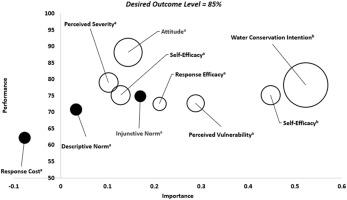计划行为理论和保护动机理论是否为居民节水提供了概率充分条件和必要条件?结合使用 PLS-SEM 和 NCA。
IF 8.4
2区 环境科学与生态学
Q1 ENVIRONMENTAL SCIENCES
引用次数: 0
摘要
了解居民节水的关键决定因素对于制定干旱和半干旱地区有效的水资源需求管理政策至关重要。尽管现有文献经常利用统计意义和相关性来确定这些决定因素,但人们越来越重视利用概率充分性和确定性必要性逻辑来理解这些决定因素。本研究综合了这两种逻辑,对计划行为理论(TPB)和保护动机理论(PMT)的综合模型进行了测试,确定并区分了住宅节水意向和行为所需的概率充分和必要条件或 "必须具备 "的因素。结合偏最小二乘法结构方程模型(PLS-SEM)和必要条件分析(NCA)来分析澳大利亚北领地(NT)居民的 346 个回答,我们发现态度、自我效能感、感知到的脆弱性和响应效能感是节水意向的概率充分条件和必要条件。自我效能感和意向进一步为节水行为提供了概率充分条件和必要条件。根据研究结果,将 TPB-PMT 构建分为四组,并使用瓶颈表来表明要实现最高水平的节水意向和行为,所确定的必要条件必须存在的最低水平。本研究进一步利用这两种逻辑进行了重要性-绩效图组合分析(cIPMA),为政策制定者和水利部门提供指导,帮助他们更好地确定水资源管理行动的优先次序,以改善居民的节水意愿和行为。本文章由计算机程序翻译,如有差异,请以英文原文为准。

Do the theories of planned behaviour and protection motivation provide probabilistic sufficient and necessary conditions for residential water conservation? Combined use of PLS-SEM and NCA
Understanding the key determinants of residential water conservation is crucial for designing effective water demand management policies in arid and semiarid regions. While extant literature has frequently identified such determinants using statistical significance and correlations, there is a growing emphasis on understanding these determinants using probabilistic sufficiency and deterministic necessity logics. Integrating these two logics to test an integrated model of the Theories of Planned Behaviour (TPB) and Protection Motivation (PMT), this study identifies and differentiates the probabilistic sufficient and necessary conditions or “must have” factors that need to exist for residential water conservation intentions and behaviours to occur. Combining partial least square structural equation modeling (PLS-SEM) and necessary condition analysis (NCA) to analyse 346 responses from residents in Australia's Northern Territory (NT), we found that attitude, self-efficacy, perceived vulnerability, and response efficacy are probabilistic sufficient and necessary conditions for water conservation intention. Self-efficacy and intention further provided probabilistic sufficient and necessary conditions for water conservation behaviour. Based on the findings, the TPB-PMT constructs are categorised into four groups and the bottleneck table is used to indicate the minimum levels of the identified necessary conditions that must exist to realise the highest levels of water conservation intention and behaviour. This study further draws on these two logics to conduct a combined importance-performance map analysis (cIPMA) to provide guidelines for policymakers and water authorities on how to better prioritise water management actions to improve residential water conservation intentions and behaviours.
求助全文
通过发布文献求助,成功后即可免费获取论文全文。
去求助
来源期刊

Journal of Environmental Management
环境科学-环境科学
CiteScore
13.70
自引率
5.70%
发文量
2477
审稿时长
84 days
期刊介绍:
The Journal of Environmental Management is a journal for the publication of peer reviewed, original research for all aspects of management and the managed use of the environment, both natural and man-made.Critical review articles are also welcome; submission of these is strongly encouraged.
 求助内容:
求助内容: 应助结果提醒方式:
应助结果提醒方式:


